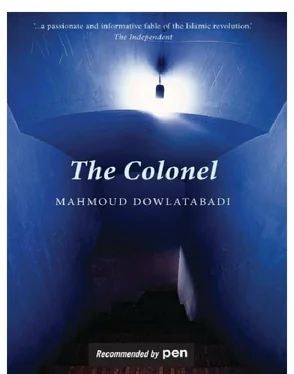the colonel listened in silence to Amir’s monologue. In his father’s presence, Amir was doing his best to speak in a measured and reasonable way. He seemed to be concentrating and trying hard not to get angry in front of the colonel. And for his part, despite the fact that Amir was not looking at him, the colonel was trying to look as though he was listening to him. He did not want to patronise his son. Whether he agreed with him or not, he was not going to allow the veil of their relationship to conceal the facts. On the face of it, he had no grounds for being proud of Amir, but inside he felt a glow of satisfaction that at least his son was at last thinking deeply about the problems of his country and his people. As a youth, like all the others of his age, Amir had been infatuated with muddled notions of changing the world.
And had the Party had a hand in all this? While Amir was being tortured in prison, he had been forced to think about the realities of life and, when the prison gates were thrown open at the beginning of the revolution, he had tried to maintain a balance in his mind between revolutionary fervour and cool calculation. When the revolution happened, however, everything suddenly changed and, in spite of his utter sense of doubt and disbelief, he had fallen for the arguments of those willing Party fellow-travellers who had volunteered to join forces with the new Islamic regime, and had allowed himself to be sucked into their ranks, until the revolution began to take knives to his comrades’ throats. Then Amir, knowing full well that he had had some part in the sharpening of those knives, had suddenly fallen into silence and brooding, and had begun to disintegrate.
From then on his whole being had been dominated by doubt and the wish to be allowed to think for himself — but it was a bit late for that now. There was no room in his head for all the questions whirling around in it, nor could he hope to resolve even the least of them on his own. The more he thought about it, the more he hated himself. He was disgusted at the way he had been taken in: hook, line, sinker and all. He did not know what to do. He had nowhere to go. He could not join those who had been executed, informed on, or who had become refugees, nor could he join those who had gone over to the new régime, which was only going to bring about a new era of refugees, informers and executions. No, he was one of those who chose to sit on the fence, ashamed of themselves, perpetual refugees from themselves, gradually immolating themselves. He tore himself apart, crying: ‘No, I shall not weep for the death of my friends, I shall not submit to the executioner’s sword, I shall not give myself up to lies and slavery. No, I will kill myself, for this is the only thing I can do, and I will do it.’
What he was saying these days was radically different from what he used to say. There was a lot of sense in what he said now. But it could not last. Before long Amir had lapsed into hatred and resignation and had retreated into his shell. Rather than speak, he stayed silent and instead of thinking, he lost himself in his nightmares once more.
His hands, which were big to start with, had grown bigger, larger than all the other parts of his body, and his fingers were even longer than his palms. When he opened his fists and showed the palms of his hands, his whole body disappeared behind them and his face looked like a battered coin. All you could see of him between his fingers were his hate-filled eyes.
He thrust those same fists, those same long fingers, into my mother’s body, twisted his fist and forearm inside her and pulled out her womb. His fist was covered in blood and torn, slashed afterbirth and we — me and Parvaneh and Masoud and Taqi — were all left struggling like newly hatched chicks in his fist, which had turned into a vulture’s talons. With his malevolent and vengeful claw he pulled us out of the afterbirth and I saw that long scrawny, seemingly mummified arm, with his sleeves rolled up to the elbow, dripping with blood, and we did not know which of us would be the first to die. We were screaming, but there was no sound. We flapped our wings, but our unfledged little wings were scrunched up in those bony fists. There was a gale blowing and we were caught up in flying branches and dead leaves and we were in the clutches of a wild eagle. There was a storm, and our screams were lost in the air and there were devils as big and black as the night sky as those claws dragged us down and down… Then I was aware of nothing until I felt his member in my throat, warm and filled with hot blood, and I heard the sharp blow of the old gravestone on my head, at the back of my neck, on my cheeks, on my shoulder blades, on my shins and arms and on my tongue, and I felt numb with pain and chewed up, like a piece of meat that has been through the mincer. He keeps beating his member — me, and all of us. He has laid his member over a lump of black stone in the hallway of that old house in Khorasan and is pissing blood, which flows down my throat and out into the street, spraying all those who pass by.
When he had his epileptic fit in the hall, the midday summer sun was shining, it was August. It was unbearably hot.
“Trapped between his legs, I am beginning to smell, I am rotting and flies are crawling over me. My wounds gradually turn into pus-filled scabs, which grow larger and larger and spread to him, covering first his legs, then his thighs, and stomach and chest and head and shoulders and arms and lips and teeth and mouth and his tongue so that we can stink together, and be corrupted. And then a unit arrives from the Point Four office to disinfect us all. 33But the putrescence has gone far beyond any normal bounds, so they have to use scissors and kitchen knives and a bow saw to remove the rotting flesh from our bones and, since we are rotten to the marrow, they decide to amputate our bones and they cut off our hands, that this corrupt body might be dismembered and then, in a manner of their own prior devising, reassembled. Once more I was lying on the concrete slab in the mortuary, and all I could hear was the rasping of the saw cutting through my leg and the roar of bulldozers outside digging a trench to bury our rottenness. I could also hear numberless graves being opened, and I imagined that they were exhuming bodies, dressing them in shining raiment and putting jewelled walking sticks in their hands. Led by a band of minstrels, the dead are to form a procession, to be honoured and glorified. And they are saying that there will soon be a big-screen showing of a sad film about the latest round of dead, a common occurrence these days. And I am still on that concrete platform, and my ligaments are being sawn through, and I hear that they are going to cremate my rottenness in the trench behind the mortuary and I shudder at the thought of the smell of burning bones and flesh and of the damp body washing house, and I am retching, but can vomit nothing up.”
“Amir… Amir, my boy… don’t do this to your father!”
But Amir was not there, and the colonel’s voice echoed back to him. A moment before, Amir had been sitting cross-legged on the floor the other side of the window. How had he managed to leave without the colonel noticing? Maybe he had not been there at all, and the colonel had just imagined him to be there? But no, he was sitting right there, just as he had been on that night when his mother was killed! the colonel could still hear him shouting:
“Hate and loathing! How long can I go on living with all this hate inside me?”
“Where are you, Amir, my boy? Speak to me, let me see you. We’re just two human beings. We used to talk to each other. I’m your father!”
“I don’t recognise anyone. I don’t know anyone and I can’t understand anything. I can’t remember my past and I don’t want to remember. I’m afraid, afraid and disgusted, that’s all.”
Читать дальше












